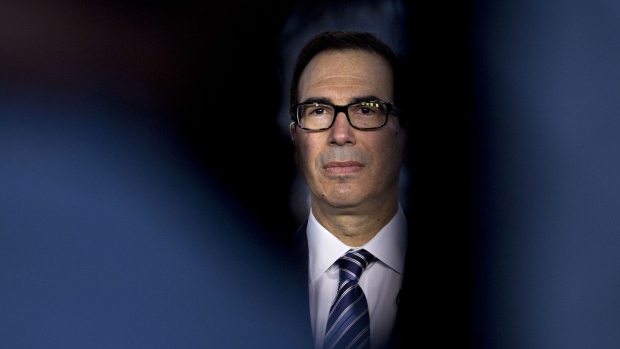Jul 12, 2019
Mnuchin warns Pelosi U.S. may run out of cash in early September
, Bloomberg News

U.S. Treasury Secretary Steven Mnuchin warned House Speaker Nancy Pelosi that the government may run out of cash in early September if Congress doesn’t raise U.S. borrowing authority.
“Based on updated projections, there is a scenario in which we run out of cash in early September, before Congress reconvenes,” Mnuchin said in a letter to Pelosi on Friday. “As such, I request that Congress increase the debt ceiling before Congress leaves for summer recess.”
Pelosi said Thursday that Congress should act this month to raise the debt ceiling, which was the first time she offered a definitive timeline. It’s not clear that lawmakers and the White House will strike a deal before the House is set to leave town on July 26 for a six-week recess.
Mnuchin and Pelosi spoke twice about the debt limit on Thursday and again on Friday. They will probably speak again over the weekend, according to a Democratic aide.
Congressional leaders acknowledged this week that waiting until September to raise U.S. borrowing authority increases the prospects of an unprecedented default. Lawmakers are scheduled to be back in Washington Sept. 9.
Republicans, Democrats and Trump administration officials intensified their negotiations this week, and all sides say a deal will get done.
‘Significant Risk’
The Treasury has been using accounting measures to avoid missing payments since the borrowing limit snapped back into place on March 2. The department’s room to maneuver depends on tax revenue, and the Bipartisan Policy Center, an independent think tank, this week adjusted its estimate to say there is a “significant risk” of defaulting on a key payment in early September.
Rates on bills maturing in mid-to-late September rose Friday, while those in early to mid-October have declined. Before the BPC estimate this week, early to mid-October maturities were the securities that had been under pressure as being most under risk of non-payment if the debt ceiling wasn’t increased in time.
“You can see now that there’s a little bit of a bulge higher in bill rates in the September time frame,” said Michael Cloherty, a New-York based strategist at RBC, attributing that move to Mnuchin’s letter. “The way Mnuchin phrased it was that there are some scenarios when it can happen in early September, not that it’s the likely one.”
"The U.S. government will run out of cash and borrowing authority about Oct. 6, meaning payments won’t be able to be fully met if the debt ceiling isn’t increased. Borrowing authority will run too close for comfort before the September corporate tax payments come in, with only about US$10 billion of room to spare.
"The Treasury bill market reflects the risk, with yields on issues maturing in early September and October trading significantly higher than the adjacent parts of the curve. A default of this kind would likely be measured in hours, as Congress can vote to raise the debt ceiling, but it would require various defensive measures by holders of T-bills, such as money market funds."
-Ira F. Jersey and Angelo Manolatos, Bloomberg Intelligence
Mitch McConnell and Kevin McCarthy, the Republican leaders in the Senate and House, also say Congress should raise the debt limit this month.
House Democrats have been trying to leverage the debt ceiling bill to increase federal spending caps, and they were looking to negotiate those caps after their August recess.
A spending caps deal, which could cover two fiscal years, would avoid an automatic $126 billion cut at the end of the calendar year. Such an agreement would help the government avoid another shutdown when funding runs out Oct. 1.
If the combined debt ceiling and budget deal continues to elude lawmakers, Democrats and Republicans have begun to talk openly of a short-term debt ceiling increase this month while budget talks continue.